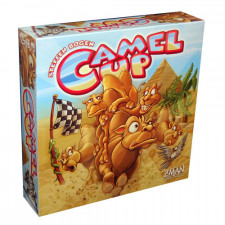Camel Up Review
on May 19, 2015
Camel Up is an easy game to like, because gambling games are usually a lot of fun. There’s an inherent drama to wagering that can punch up even a drab game. It personalizes the action in a direct way, and creates moments where everyone at the table either cheers or groans all at the same time. Camel Up attempts to make this experience as simple and accessible as possible while still remaining recognizable as a gambling experience. In the process it loses some of the punch that makes betting such an appealing mechanic, but it’s still able to produce those moments where everyone at the table feels compelled to stand up, anticipating results.
Five camels race a single lap around the board. The player is given several options on their turn, but the most common is to place a bet. There are a stack of three cards for each camel, and a player can take one to secure a payout if that camel is in first or second place at the end of a single leg of the race. It’s also possible to place a bet on the final outcome of the race, either on who will be first or last. Another action is to choose to move a camel. Their movement is dictated by modified d6’s, which can move each camel from one to three spaces. Once every camel has moved once, the leg is over and all bets are paid out before starting the next. The dice to be rolled is selected using a little cardboard pyramid, which functions as a secret dice-dispenser. It’s kind of an unnecessary touch, since it would have been just as effective to draw them out of a bag. But it does offer a fun visual flare, and it’s an imposing physical presence on the board. And to be fair, there is definitely something satisfying about pushing the slider to drop another die. At the end of the race, the players receive their money for correctly predicting the winner and loser, and the most money wins.
While playing Camel Up, a few players compared it to the dearly departed Manila, which is one of the best-loved German games to feature gambling. The comparison isn’t totally off-base either, since both games have the same tension when the dice are rolled, and the same tendency to produce surprising finishes. But Camel Up is very clearly positioned in the family game market, a fact reflected in a couple design decisions. For one thing, there simply aren’t a whole lot of things you can do on your turn. The available bets are all pretty basic, although there are ways to alter the board and make the camels shift around a little bit. In addition the bets offer very little penalty when they’re wrong, usually just forcing the player to give up a coin here or there. No one is going to be in a situation where they put everything on the line and lose their shirt.
That latter design element is one of my big disappointments with Camel Up. I understand why it was done that way, but it effectively removes some of the risk from a game that has risk as its central mechanic. It also would be nice to have some more options for betting, maybe a way to set up a two-camel teaser or something like that. That would probably move the game beyond its intended market, but it would have made for something more dramatic and fun and it probably wouldn’t have added to the rules too much.
But there are still great moments where Camel Up delivers the goods. This is largely because of the stacking mechanic. If a camel lands on a space with another, it goes on top of the other occupant. From then on, it moves along with any camel beneath it. This creates some fun situations where a last place camel gets lucky and suddenly moves into the lead in just a couple rolls. It also makes for absurdities like a giant stack of all five camels that moves as a giant camel monolith. The distribution of the dice do a good job at keeping the race close, though I have seen the occasional session where one camel jumps way out in front and never really gets challenged. But most times the camel in the lead can drop fast, because the camel on the top of the stack is considered to be in the lead. That means that the guy in last can become first if the pieces are clumped together, and can move up quickly even if they’re not. Even if the betting is milder than I’d like, Camel Up can still create situations where you pump your fist or curse loudly, depending on the situation.
Camel Up took home the Spiel des Jahres last year, and it’s a solid choice. It feels like something out of Germany circa 1987, which makes it kind of an old-school winner but one that plays to the original intent of the family games-centric award. Its accessibility means that it’s not quite as dramatic as it could be, but what’s there still works very well.

 Customer Support
Customer Support  Subscribe
Subscribe 




 Account
Account  Wishlist
Wishlist 

